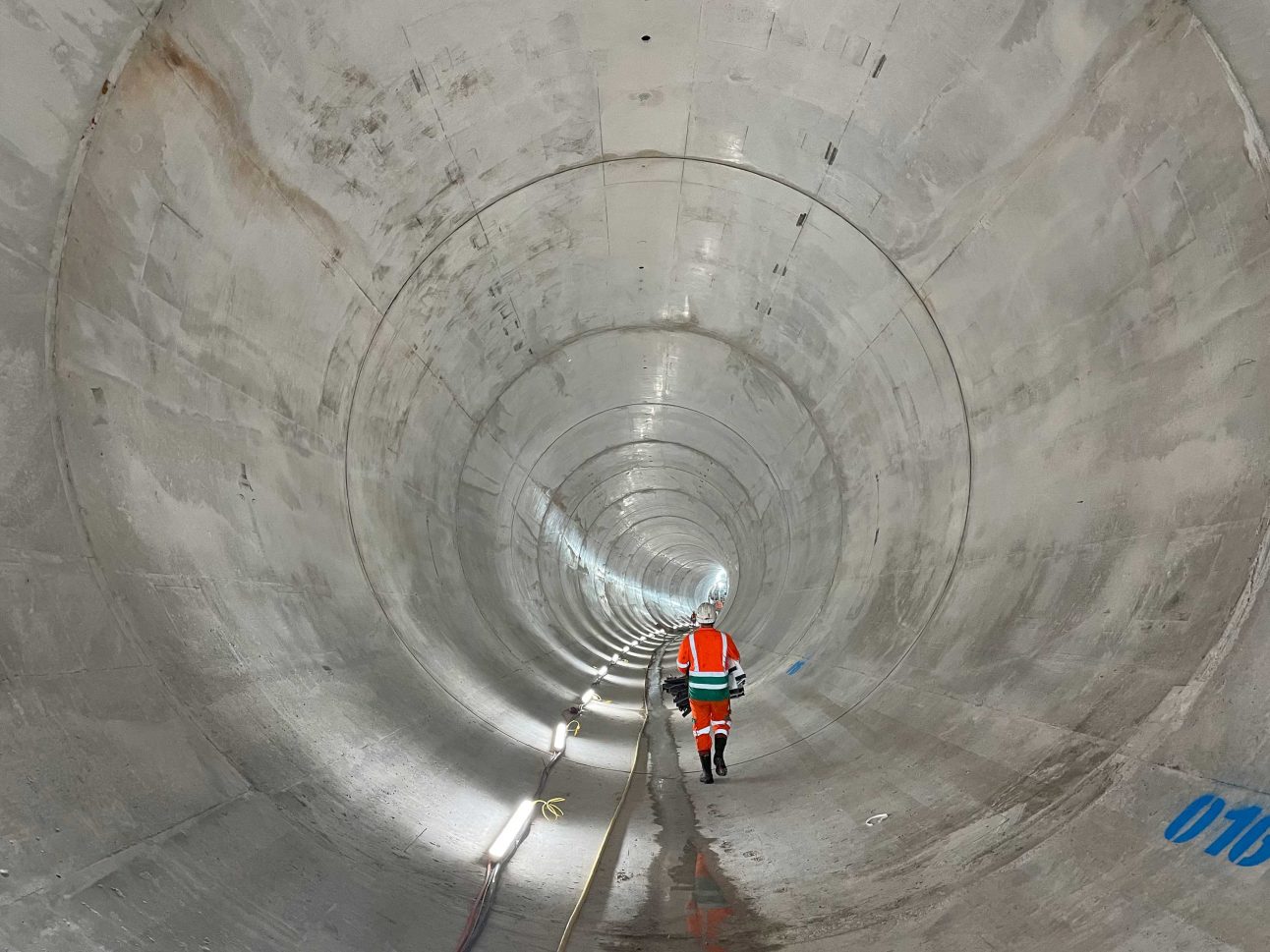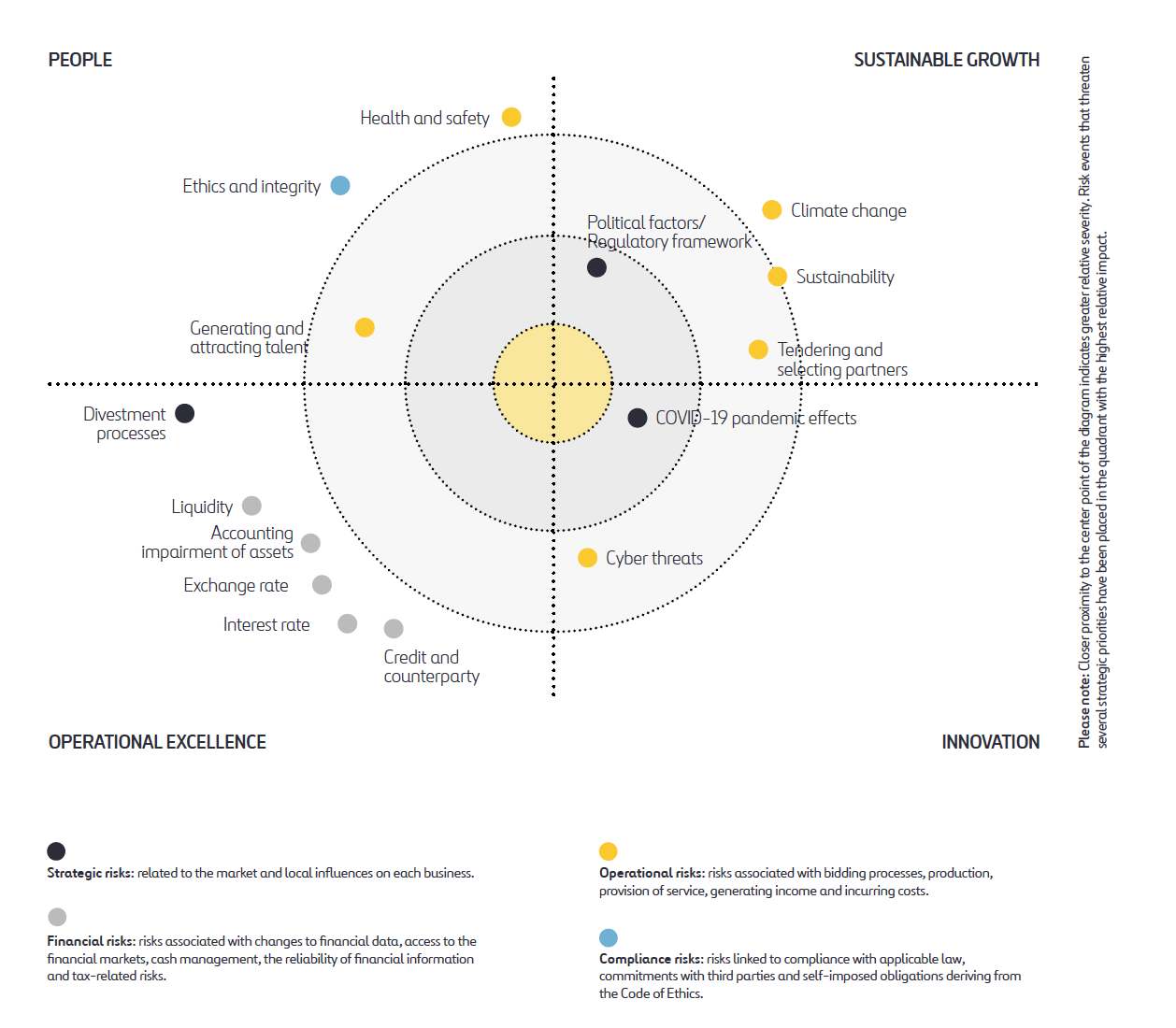-
1. Management Report 2021
- 1.1 In two minutes
- 1.2 Strategy and value creation
- 1.3 Ferrovial in 2021
- 1.4 Risks
- 1.5 Corporate Governance
- 1.6 Expected Business Performance in 2022
-
Appendix
- Alternative Performance Measures
- Sustainability Management
- Reporting Principles
- European Taxonomy
- Task Force on Climate Related Disclosures
- Scoreboard
- Contents of Non-Financial Information Statements
- SASB Indicators
- GRI Standard Indicators
- Appendix to GRI Standards Indicators
- Glosary of Terms
- Verification Report
-
2. Consolidated Financial Statements 2021
- Consolidated Financial Statements
- Audit Report
Main Risks
The management on the identification, evaluation, mitigation and monitoring of risks is carried out independently by the Compliance and Risk Department under the supervision of the Audit and Control Committee of the Board of Directors.
The chart displays the most relevant risk events that threaten the execution of Ferrovial’s corporate strategy.
Below is a description of the most relevant risk events, their potential impact and a list of the main control measures implemented to mitigate their impact and/or probability of occurrence.
| RISK EVENT | DESCRIPTION | POTENTIAL IMPACT | CONTROL MEASURES |
|---|---|---|---|
| COVID-19 Pandemic Effects |
The economic recovery is being hindered by the new mutations and the uneven vaccination rate. All this casts uncertainty on the expectations for the recovery of mobility to pre-covid levels. On the other hand, the pandemic is accelerating the trend towards digitization in social interaction (teleworking, e-commerce, etc.), with a potential impact on mobility patterns and, therefore, on the performance and value of the infrastructures operated by Ferrovial. |
|
|
|
Political factors/Regulatory framework |
In some of the markets in which Ferrovial operates, the recovery after the pandemic is affected by political and social movements, in some cases protectionist, which could lead to regulatory changes impacting asset management and the development of future projects. The negotiation of the next regulatory period for Heathrow Airport may impact the value of the asset. |
|
|
|
Cyber Threats (see cybersecurity section pages 104-105) |
In a highly digitalized and interconnected economic environment, the risk of cyber threats has grown exponentially in recent years, increasing attacks against companies and critical assets (Asset Disruption, Phishing, Digital Identity Theft, etc.). In this context, infrastructures are exposed to threats in cyberspace (mafias, hostile government agencies, hacktivists, insiders, etc.), which can impact the normal operation of assets, their ability to generate the expected value and the Company’s reputation. |
|
|
|
Generating and attracting talen |
The increase in demand for skilled labor in the geographic areas (USA, UK and other western countries) where the operation and construction of transport infrastructure is concentrated makes it difficult to attract and retain talent, which could impact the company’s competitiveness. |
|
|
|
Bidding projects and inflation |
Ferrovial participates in highly competitive bidding processes for large infrastructure projects with long maturity periods that require an adequate study of prices and deadlines, the availability of reliable suppliers, as well as the selection of suitable partners with sufficient technical and economic capacity. The risk of making mistakes in the study and in the choice of partners and suppliers may affect the established profitability and growth objectives. On the other hand, the inflationary stress currently being experienced by the raw materials market worldwide increases the risk of not meeting the expected profitability expectations.
|
|
|
| Sustainability (see Environment section, pages 92-94) |
Both regulators and other stakeholders demand that the business objectives of organizations be sustainable, both from an environmental and social point of view, and are willing to penalize companies that do not meet their expectations. A misalignment between the company’s strategy and the expectations of stakeholders in sustainability would compromise the fulfillment of Ferrovial’s growth and investment objectives. |
|
|
| Health and Safety (see Health and Safety section, pages 80-81) |
The nature of Ferrovial’s activities entails the risk of accidents that may endanger the health and safety of people (employees, customers, etc.) and may also cause damage to the company’s operations. The current global pandemic context implies an additional risk to the health and safety of employees and the continuity of operations. |
|
|
| Climate Change (see Environment section, pages 92-94) |
Exposure to physical and transactional risks in Ferrovial’s activity derived from climate change. On the one hand, extreme weather events may affect infrastructure and the development of the activity and, on the other, global trends to reduce the causes and consequences derived from climate change may entail economic (such as the increase in the cost of raw materials), regulatory, technological and/or reputational effects. |
|
|
| Ethics and Integrity (see Integrity section, pages 88-89) |
Ferrovial is exposed to the commission of acts by its employees or collaborators that may involve a breach of the required principles of integrity, transparency and respect for legality and human rights. |
|
|
| Financial Risks (see section Risks pages 110-114) |
Ferrovial’s businesses are affected by changes in financial variables, such as interest rates, exchange rates, inflation, credit, or liquidity. |
|
|
EMERGING RISKS AND EVOLUTION OF THE MAIN RISKS
Evolution of significant risks during the year: the risk of divestment of the Services Division has decreased, after having completed the sale in 2021 of part of the business (Environment in Spain and Portugal and Oil & Gas in North America) and reached a sale agreement on Infrastructure Services in Spain. However, the divestment of the rest of Ferrovial Services’ businesses continues in the United Kingdom and Chile.
On the other hand, thanks to the Ferrovial Risk Management process, emerging risks caused by external agents with a potentially relevant long-term impact on the business are also identified, assessed and monitored. Among others, the following risks stand out:
| RISK EVENT | DESCRIPTION | POTENTIAL IMPACT |
|---|---|---|
|
Protection of Biodiversity and Natural (see Environment section, pages 92-94) |
The degradation of ecosystems and natural capital entails operational, economic and reputational risks for the development of business activities. Specifically, Ferrovial could be affected by the loss of quality of certain ecosystem services, such as lack of water or reduced availability of certain raw materials.
|
To ensure responsible management of biodiversity, the company has developed a methodology and an internal tool for calculating the natural capital debt called INCA, based on the automation of the calculation of the impact on natural capital and ecosystem services.
|
|
The Great Resignation |
The effects of the pandemic on the health and wellbeing of people may have a significant impact on the availability of the workforce in the medium/long term. Changes in workers’ motivations and expectations may follow the lived experience, which could affect the availability of (mainly senior and skilled) professionals to fill certain positions. There is an increase in the rate of job abandonment compared to the pre-covenant situation in some professions which, if sustained in the long term and extended to other activities, will produce an inflationary effect in middle management and skilled positions.
|
The company is analyzing new flexibility measures to adapt to changes in employee needs. |

Thames Tideway Tunnel, London, United Kingdom

